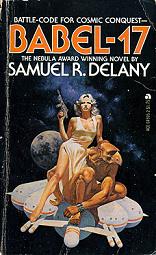
Babel 17
Samuel R. Delany
158 pages
published in 1966
Babel 17 was the first Delany novel I ever read, some ten years ago or so; this was the first time I've reread it. It might be considered, together with The Einstein Intersection, as his breakthrough novel, the novel that made his name as a writer of literary, innovative science fiction. Unlike some of his later novels, it is not yet so experimental in style or subject matter that it scares of hardcore science fiction readers, sometimes a notoriously conservative bunch. Babel 17 is in fact one of the earliest examples of the New Space Opera, which reinvigorated this old subgenre by keeping its strengths (large canvas, sense of wonder, gripping adventure) but losing its weaknesses (cardboard characters, weak writing, simplistic morals). Babel 17 therefore had something for every science fiction fan.
The plot of the novel is typical for space opera. It's sometime in the future and humanity, united in the Earth Alliance is fighting a war against the socalled Invaders, a war which has been going on for decades. Lately there has been a spate of mysterieus attacks and sabotage incidents whose only connection is that just before such an attack starts, the area in which it happens is saturated with radio broadcasts. These broadcasts are in code, which is dubbed Babel 17 and has sofar proven to be unbreakable. The army therefore turns to Rydra Wong, the most fashionable and famous poet in existence, who used to work for the Earth Alliance's intelligence services and still has a reputation of being able to break even the most complicated codes. It is she who realises Babel 17 is not a code or a cypher, but a language. She also realises that in order to learn to speak the language, she has to be at the site of attacks as they happen and immerse herself in the language. So she assembles a crew to run her spaceship and goes off. Through a series of encounters she gradually learns both the language and the terrible secret that is Babel 17.
Even in his earliest, most journeyman like work Delany had a knack for creating exotic yet believable worlds to set his stories in, immersing the reader in them through a wealth of well chosen detail. With Babel 17 this knack has come into full blossom, further maturing in later novels like Nova. What Delany had that a lot of his contemporaries lacked was a feeling for culture and the arts as just as important subjects for science fiction as science and technology traditionally are. In Bab bel 17 Delany manages to merge these two subjects, science and culture, as the story revolves around language, which can be understood both scientifically and culturally.
More specific, Babel 17's central concept revolves around the Sapir-Whorf hypothesis, the idea that language determines thought; in its strongest variant that no thought is possible outside of language. The hypothesis also suggests that difference in what language you speak shapes how you think; which is part of the plot here. Babel 17 is supposed to be the ultimate logical language, in which you cannot make mistakes; the language in fact forces you to think logically.
This is something that even at the time was dodgy and since then has been debunked pretty thoroughly, as the Wikipedia article linked to above should make clear. If you are likely to be outraged by such clearly wrong science, avoid this book. On the other hand, it is no more outrageous than some of the physics howlers committed by other authors, certainly no more so than John Brunner making Pi equal 3 in one of his novels (later retconned as taking part in an universe with different laws of nature). Science fiction may after all pretend to be all about science, but it's just as likely to use pseudoscience if it makes for a better story...
Read more about:
Samuel R. Delany,
Babel 17,
science fiction,
book review